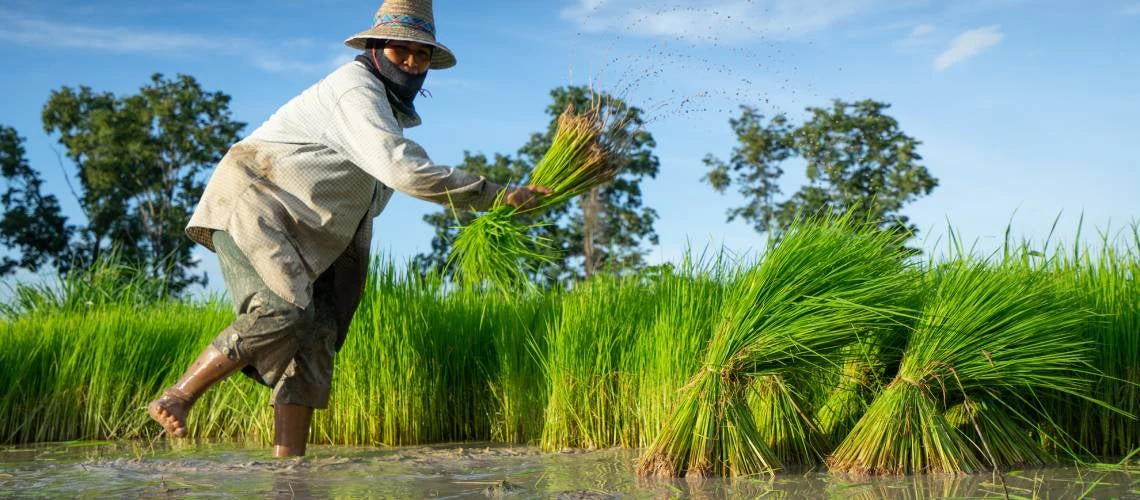 Through its work, GWSP has supported World Bank projects that provided access to water or sanitation to nearly 30 million people and added 2.9 million hectares under sustainable land and water management practices.
Through its work, GWSP has supported World Bank projects that provided access to water or sanitation to nearly 30 million people and added 2.9 million hectares under sustainable land and water management practices.
GWSP’s work is critical for delivering on the water-related Sustainable Development Goals and the Paris climate commitments.
The World Bank is transforming to become better, faster, and bigger to deliver development impact more effectively for people and the planet. Water security, with an emphasis on climate adaptation, has emerged as a priority for the World Bank to advance its new vision to create a world free of poverty on a livable planet. Water is central to human development, economic growth, and the health of our planet. But climate change is making this critical resource more scarce, more erratic, and more polluted.
To tackle global challenges such as the water crisis and put the world back on track to achieving the Sustainable Development Goals (SDGs) by 2030, the World Bank is evolving its ambition, strengthening its solutions, and enhancing and modernizing how it provides finance and knowledge. To respond to this global water challenge, the World Bank has initiated a new Fast Track Water Security and Climate Adaptation Global Challenge Program to mobilize and scale up support for water.
This global challenge program is one of six pilot programs that will use replicable and scalable approaches to support countries in addressing development needs with greater speed and impact, while helping to ramp up our response to global challenges. Each program will comprise a series of country-level operations that are part of a broader, globally coordinated platform, providing participants with networking and learning opportunities.
The program aims to strengthen water security in client countries through systems change and scaling up more sustainable water management and disaster risk reduction solutions. Specifically, it will support improved access to water supply and sanitation; improved irrigation service delivery and water productivity; and flood and drought risk reduction.
As a center of excellence for water-related issues, the Global Water Security and Sanitation Partnership (GWSP) is well-positioned to provide analytical and knowledge support to the Fast Track Water Security and Climate Adaptation Global Challenge Program.
As its 2023 annual report shows, GWSP has the skills, tools, and expertise to scale up impact. GWSP supports and enables governments to develop solutions and increase investment for a water-secure world. It provides assessments and tools to design programs, builds capacity to effectively implement programs, provides policy advice to establish an enabling environment, and brings global expertise to solve complex challenges.
This year, GWSP activities ranged from training staff of Tunisia’s national wastewater utility on establishing public-private partnerships that will deliver better managed sanitation services, to using remote sensing and climate modeling to evaluate the state of Ukraine’s irrigated agriculture sector, to assisting with the design of a $1.25 billion project to dramatically boost water and sanitation services in the Democratic Republic of Congo; to informing sector policies and strategies to strengthen water security in Nepal.
Through its work, GWSP has supported World Bank projects that provided access to water or sanitation to nearly 30 million people ; helped 2.79 million farmers adopt improved agricultural technology; added 2.9 million hectares under sustainable land and water management practices; provided nearly 2,560 schools and health centers with access to improved water and sanitation services; and created or strengthened about 5,160 water user associations.
Furthermore, GWSP has supported the development of the water sector in 18 countries affected by fragility, conflict, and violence. Its support in these settings helped provide 3.45 million people with access to improved water sources and 2.88 million people with access to improved sanitation services through World Bank-financed projects in FY23.
This is why GWSP is the partner of choice to collectively advance water security and climate adaptation for our common future. As a platform for collaboration and support of the water-related SDGs, partnerships play a key role in how GWSP works. To meet SDG 6—clean water and sanitation for all—by 2030, GWSP aims to further diversify its donor membership with both traditional and emerging donors, and to deepen partnerships with development finance institutions, multilateral development banks, the private sector , philanthropic organizations, and other actors for greater impact.
While the challenges are big, we are optimistic that by working together, we can have an even larger impact in helping countries achieve a water-secure world for people and a livable planet.
Related Links:
Going With a Better Flow: Improving Policy and Delivering Results at Scale in Global Water


Join the Conversation